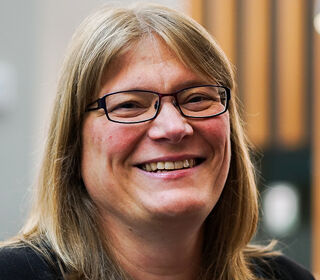
Blog

With a huge variety of wonderful staff members and academics teaching our courses and shaping the futures of our students, we wanted to unpack their stories and discover how they got to where they are now.
Jessica Wagner, Senior Lecturer in Social Work and Course Leader for MSc Social Work, shares an insight into her life and work.
What do you do at BCU and how long have you been part of the University?
I am a Senior Lecturer in Social Work and the course lead for the MSc Social Work. I joined BCU almost four years ago after working several years as a lecturer and senior lecturer at different institutions. In addition to my role as a course lead, I also oversee admissions to the programme and teach across courses, albeit that I have a particular focus on ethics and values, safeguarding children and domestic abuse.
Could you tell us about your experience and how this feeds into your teaching?
My practice background is predominantly in safeguarding services for children, but I have also spent time in a schools team and in a youth justice service. Whilst in practice, my interest in social justice led me to enrol on an MA Human Rights, Globalisation and Social Justice, and I subsequently completed an internship at the United Nations in Geneva. This was a very different experience, yet one that instilled within me an even stronger sense of social justice, which I feel is at the heart of social work.
The beauty of social work is that it is very broad in scope and there are so many ways to practice as a social worker. Working with people is never the same and highlights the complexity and diversity of situations one may be faced with. I really feel that the variety of experiences I have had over the years is reflected in my teaching today.
What are some of the greatest achievements you have accomplished at BCU?
That is a hard question for a social worker! I am very fortunate to be working with a great team, that is ambitious and active. I am very proud to have been part of founding the new Social Work, Education, Policy and Practice (SWEPP) Research Group, which is very exciting, and I am looking forward to what we can achieve together. I am also proud to be actively involved in some international collaborations and in organising and facilitating international events.
My greatest achievement will always be educating our students, igniting in them a fire of passion for the profession, enabling them to challenge inequality and injustice, and to advocate for others, therefore making a real difference.
What makes the course you teach on distinct and what is the learning environment like?
We are the largest provider of social workers in our region. We are proud to be a very supportive team and are dedicated to providing our students with transferrable and independent critical thinking skills. We have a very experienced service user and carers group who support and strengthen the programme and provide real life insight of social work intervention within the classroom.
A large part of our MSc programme is practice-focused, with placements taking place in both years, and students are supported throughout to apply the learning from the classroom to practice. We are actively engaged in the West Midlands Teaching Partnership for Social Work, and as such have a great many partners supporting the education of future social workers in the region.
Why do you think Birmingham is a good place to study?
Birmingham is a super diverse city and this diversity is reflected in our programme and in our students. Birmingham as a city offers a great range of cultural and leisure opportunities, where one can engage in exploring British but also international history. From a course perspective, we find that we have a real diverse group of students coming together; different ages, ethnicities, cultures, backgrounds and personal experiences, all learning from each other in addition to the curriculum.
What can students do to help prepare them for the course you teach?
Our course is intensive and demanding, but also rewarding. I think it reflects the profession we are working within. Students need to be ready for that commitment and have some understanding of the profession they are about to enter. Adding to that are of course the challenges of stepping up from undergraduate to postgraduate study. There are expectations that students are independent learners, and are able to engage with inter-disciplinary literature, so as a starting point we always suggest to applicants that reading around the subject would be useful in advance.
What’s your favourite thing about working at the University?
Its many opportunities – without a doubt!
Social Work Courses
Find out more about our courses